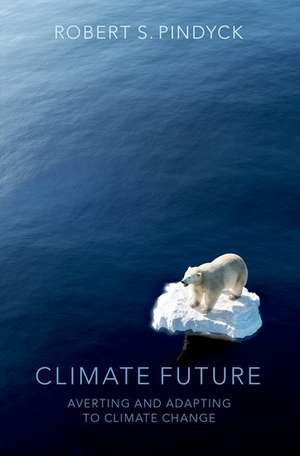Climate Future: Averting and Adapting to Climate Change
Autor Robert S. Pindycken Limba Engleză Hardback – 14 noi 2022
Preț: 225.40 lei
Preț vechi: 243.03 lei
-7% Nou
Puncte Express: 338
Preț estimativ în valută:
43.14€ • 46.88$ • 36.26£
43.14€ • 46.88$ • 36.26£
Carte disponibilă
Livrare economică 20-26 martie
Livrare express 15-21 martie pentru 48.55 lei
Preluare comenzi: 021 569.72.76
Specificații
ISBN-13: 9780197647349
ISBN-10: 0197647340
Pagini: 248
Ilustrații: 40 b&w illustrations
Dimensiuni: 164 x 238 x 22 mm
Greutate: 0.54 kg
Editura: Oxford University Press
Colecția OUP USA
Locul publicării:New York, United States
ISBN-10: 0197647340
Pagini: 248
Ilustrații: 40 b&w illustrations
Dimensiuni: 164 x 238 x 22 mm
Greutate: 0.54 kg
Editura: Oxford University Press
Colecția OUP USA
Locul publicării:New York, United States
Recenzii
the author concedes the need to address climate change as soon as possible to avert far greater costs of future climate heating.
One of the best books ever written about climate change. Pindyck brilliantly lays out how much we don't know, and why we don't know it. He also shows what we need to do, amidst all those question marks. (Hint: Adapt!) Intriguing and wise-and indispensable.
Very different from the many other books that exist on this matter, which are either painting a totally unrealistic happy ecological transition or overly techno-optimistic, Climate Future generates an important new message: Risk management must be a key tool for optimizing our climate policies.
With greatly increasing attention being given to global climate change, there has been an explosion of books and articles, some of which are worthwhile reading. But Robert Pindyck's new book is one that must be read-whether by scholars, policy makers, journalists, or the interested public. It provides a reality check by honestly and methodically assessing what we know and what we don't know about climate change and the possibilities of averting and adapting to it. Pindyck is a world-class economist, at the top of his game, and a leader in the area of energy and environmental economics. His book is solid yet fresh, broad yet deep, and ultimately of tremendous value.
Pindyck (Massachusetts Institute of Technology) describes in detail the impact of changing carbon dioxide levels on Earth's temperature and why greenhouse gases have this effect on the environment. The premise of his argument is to examine what policies at the national and international levels could avert the temperature increase and what potential strategies exist for adapting to the changing climate. Pindyck clearly shows that no single policy or strategy will change the climate trajectory and that a comprehensive approach across all sectors of the economy that includes reducing emissions and energy demand, adopting conservation practices that reduce energy demand, and utilizing different forms of energy is required.
One of the best books ever written about climate change. Pindyck brilliantly lays out how much we don't know, and why we don't know it. He also shows what we need to do, amidst all those question marks. (Hint: Adapt!) Intriguing and wise-and indispensable.
Very different from the many other books that exist on this matter, which are either painting a totally unrealistic happy ecological transition or overly techno-optimistic, Climate Future generates an important new message: Risk management must be a key tool for optimizing our climate policies.
With greatly increasing attention being given to global climate change, there has been an explosion of books and articles, some of which are worthwhile reading. But Robert Pindyck's new book is one that must be read-whether by scholars, policy makers, journalists, or the interested public. It provides a reality check by honestly and methodically assessing what we know and what we don't know about climate change and the possibilities of averting and adapting to it. Pindyck is a world-class economist, at the top of his game, and a leader in the area of energy and environmental economics. His book is solid yet fresh, broad yet deep, and ultimately of tremendous value.
Pindyck (Massachusetts Institute of Technology) describes in detail the impact of changing carbon dioxide levels on Earth's temperature and why greenhouse gases have this effect on the environment. The premise of his argument is to examine what policies at the national and international levels could avert the temperature increase and what potential strategies exist for adapting to the changing climate. Pindyck clearly shows that no single policy or strategy will change the climate trajectory and that a comprehensive approach across all sectors of the economy that includes reducing emissions and energy demand, adopting conservation practices that reduce energy demand, and utilizing different forms of energy is required.
Notă biografică
Robert S. Pindyck is the Bank of Tokyo-Mitsubishi Professor of Economics and Finance in the Sloan School of Management at MIT. He is also a Research Associate of the National Bureau of Economic Research, and he has been a Visiting Professor at Tel-Aviv University, Harvard University, and Columbia University. He is a Fellow of the Econometric Society, a past President and Fellow of the Association of Environmental and Resource Economists, and a winner of the Jamieson Prize for Excellence in Teaching. Professor Pindyck's research and writing have covered topics in microeconomics and industrial organization, the behavior of natural resource and commodity markets, financial markets, capital investment decisions, and environmental economics. His recent work in environmental economics has focused on climate change, and examined policy design in the face of uncertainty. He has also worked on the economic and policy implications of global catastrophic events, including the COVID-19 pandemic.Professor Pindyck has published numerous academic journal articles, and he is also the author or co-author of seven books, including three popular textbooks: Econometric Models and Economic Forecasts, Microeconomics, and Investment Under Uncertainty.
